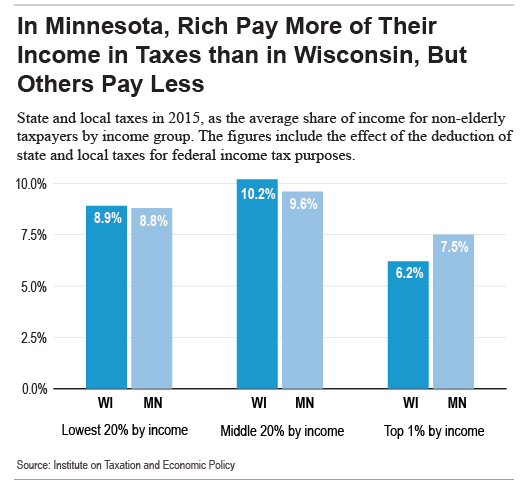Millionaires Love Minnesota
Number of wealthy climbs 15% after state tax hike.
![Minneapolis. Photo by Bobak Ha'Eri (Own work) [CC BY 3.0 (http://creativecommons.org/licenses/by/3.0)], via Wikimedia Commons](https://urbanmilwaukee.com/wp-content/uploads/2016/05/1280px-2008-0712-MPLS-panorama.jpg)
Minneapolis. Photo by Bobak Ha’Eri (Own work) [CC BY 3.0 (http://creativecommons.org/licenses/by/3.0)], via Wikimedia Commons
This article in the Minnesota StarTribune sums up the results:
“Critics predicted that the ultra-affluent would flee after Gov. Mark Dayton secured 2013 passage of a new income tax tier of 9.85 percent on individuals who make more than $156,000 a year. But the latest data show that the number of people who filed tax returns with over $1 million in income grew by 15.3 percent in the year after the tax passed, while the new top tier of taxpayers grew by 6 percent.”
The tax increase on top earners helped Minnesota make investments in the state’s schools, communities, and infrastructure. This column in the StarTribue explains:
“[Governor Dayton’s] 2013 tax reform bill put our state on the path to long-term growth and fiscal stability with a balanced mix of spending cuts and new revenue, mostly from higher income taxes on the wealthiest 2 percent of Minnesotans. [Governor Dayton’s] plan is based on honest budgets — not one-time accounting shifts — so we can pay for our investments with responsible fiscal management.”
Wisconsin lawmakers have taken a different approach. Instead of requiring wealthy residents to contribute more, lawmakers have reduced their income tax rates and implemented specific tax breaks that mostly benefit people with high incomes. For example:
- Lawmakers cut income tax rates across the board a few years ago, including rates for the wealthy. In 2016, tax filers with incomes of $300,000 or above got an average tax cut of nearly $1,200 from the rate cut. The average income tax cut for taxpayers earning under $20,000, when you include people who missed out entirely, was just 70 cents.
- In 2015, lawmakers nearly abolished the Alternative Minimum tax, which is aimed at making sure that wealthy taxpayers pay some minimum amount of income tax. This tax cut carries a price tag of about $30 million per year, with the majority going to taxpayers earning more than $200,000 per year.
- In 2011, Wisconsin lawmakers reduced taxes on income earned from investments, or capital gains. That tax cut will add up to about $100 million per year when fully phased in. About half the income from capital gains goes to taxpayers earning more than $200,000.
After these tax changes, the richest residents in Minnesota pay a larger share of their income in state and local taxes than Wisconsin residents do. In Minnesota, the top 1% of taxpayers by income pay 7.5% of their income in state and local taxes, compared to 6.2% in Wisconsin. Middle- and low-income taxpayers in Minnesota, on the other hand, pay a smaller share of their income in taxes than their counterparts in Wisconsin.
Minnesota has shown that requiring the richest residents to pay more in taxes can successfully raise the resources necessary to make key investments in a state’s future – while making the state tax system fairer at the same time. Wisconsin lawmakers should look across the border to observe Minnesota’s success, and follow in our neighbor’s footsteps.
Wisconsin Budget
-
Charting The Racial Disparities In State’s Prisons
 Nov 28th, 2021 by Tamarine Cornelius
Nov 28th, 2021 by Tamarine Cornelius
-
State’s $1 Billion Tax Cut Leaves Out 49% of Taxpayers
 Sep 21st, 2021 by Tamarine Cornelius
Sep 21st, 2021 by Tamarine Cornelius
-
TANF Program Serves a Fraction of Poor Families
 Aug 30th, 2021 by Jon Peacock
Aug 30th, 2021 by Jon Peacock























Walker is too ignorant and stubborn to change course. Walker is a firm believer in trickle down economics. No matter how much evidence disproving the effectiveness of trickle down economics our state’s republicans will never change.
Sadly, we’ll have to live with him and a number of others (Paul Ryan comes to mind as well) that came of age in the era of Reagan. His “government is the problem” quip set America on a disastrous course.
I grew up in Minnesota and it is a fantastic state to live, work and raise a family. I believe the economic and political structure in place is due to the Scandinavian immigrants who formed what the state is today. It seems to mirror the high quality of life found in the Scandinavian countries.
New Jersey tax system would be a good article as well. One particular tax payer is leaving. David Tepper has contributed an estimated $500 million dollars in income taxes to the state of New Jersey over the last five years. Now the state is scrambling to fix the whole in the budget.